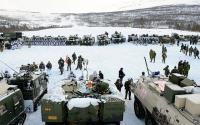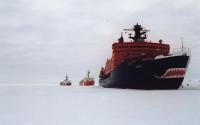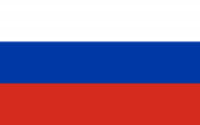Arctic Militarization

With the economic potential for new sources of mineral and energy resources and new shipping routes, many Arctic nations are preparing for a resource struggle in the Arctic.
Quicktabs: Keywords

As climate change opens up the Arctic for transit and exploration, Russia has increasingly militarized the region. The U.S. is preparing a more aggressive presence of its own.
[ More ]
The U.S. Coast Guard has begun work to design and buy three heavy and three medium polar icebreakers, but the service reserves the right to increase the size of the program or even add offensive weapons to them if needed to respond to a rapidly changing Arctic environment, the commandant said.
[ More ]
The U.S. is closely watching the Russian buildup in the Arctic, the biggest since the fall of the USSR with Russia bolstering its fleet of nuclear-fueled icebreakers, reopening abandoned Soviet military bases and building a string of new ones.
[ More ]
Republican U.S. Sen. John McCain of Arizona said that Russia has become a "national security issue" for the U.S. in an interview Friday with Politico's Morning Defense team. His comments were made ahead of a congressional delegation trip he has been planning to the Arctic as a response to a rapidly growing Russian military presence off the coast of Northern Europe.
[ More ]
Tensions have increased a notch in the Arctic with the news that the Russians have started a major military exercise in the region. Nearly 40,000 servicemen, 41 warships and 15 submarines will be taking part in drills to make them combat-ready—a major show of strength in a region that has long been an area of strategic interest to Russia.
[ More ]
This winter, the U.S. Army gathered elite international soldiers at its Northern Warfare Training Center in Alaska. The U.S. military is restructuring its forces around the world and that includes getting troops battle-ready far to the North.
[ More ]
Vladimir Putin sends troops and jets to oil- and gas-rich Arctic region also coveted by Canada, United States, Norway and Denmark in an apparent show of military force.
[ More ]
A new study indicates that the Arctic Ocean is also becoming more acidic, another consequence caused by greenhouse gases in the atmosphere. It’s a process that occurs when carbon dioxide dissolves out of the air and into the sea, lowering the water’s pH in the process.
[ More ]Further, the responses of Arctic nations have been framed more as nationalistic and emotional arguments, rather than legal opinions. Despite the dubious legal authority of the Russian flagplanting in 2007, the incident provoked a degree of international consternation. True, a "19th Century imperial land grab" n242 in the Arctic is not a feasible outcome, since UNCLOS does provide a mechanism for resolving disputes that can be relied on to a certain extent. However, the illegality of a land grab does little to dampen the excited clamor of an Arctic "resource rush," poorly disguised by the other Arctic States. For example, Canada's Foreign Minister at the time objected to the imperial nature of Russia's expedition. n243 Prime Minister Stephen Harper also hopes that Canada's renewed commitment to the region will bolster its longterm presence and strengthen the nation's sovereignty over the Arctic. n244 A Danish scientist has stated that "'the Vikings hope to get [to the Arctic] first.'" n245 The Russian scientist and legislator Artur Chilingarov has avowed that "'the Arctic is ours and we should demonstrate our presence.'" n246 There is good reason to expect that the frenetic scramble to establish Arctic sovereignty will only gain momentum as the ice continues to recede, especially considering "the alacrity with which coastal states [first] 'implemented' the sovereign rights ... with respect to oil and gas, fisheries, and other natural resources of the economic zone and continental shelf" when UNCLOS entered into force.
